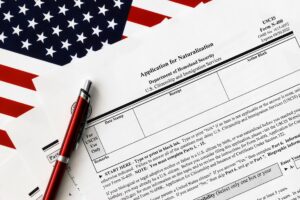According to Section 322 of the Immigration and Nationality Act, you, as a United States citizen parent, may apply for and obtain a Certificate of Citizenship for your child who was born and who resides abroad by submitting form N-600K to the U.S. Citizenship and Immigration Services (USCIS) accompanied by required evidence.
The Child Citizenship Act of 2000 (CCA) amended the Immigration and Nationality Act (INA) to cover foreign-born children who did not automatically acquire citizenship under INA 320 and who generally reside outside the United States with a U.S. citizen parent.
Requirements for Citizenship Under Section 322
If your child or grandchild has been regularly residing outside of the United States, they are eligible for naturalization if all of the following conditions have been met:
- You are a U.S. citizen by birth or through naturalization (including an adoptive parent)
- You meet certain physical presence requirements in the United States or an outlying possession
- Your child or grandchild is under 18 years of age;
- Your child or grandchild resides outside of the United States in your legal and physical custody as a parent or (if you’re a grandparent) in the custody of someone who does not object to your application if their U.S. citizen parent is deceased
- The child is lawfully admitted, physically present, and maintaining lawful status in the United States at the time the application is approved and the time of naturalization
Certain of these requirements can be waived if you are in the U.S. armed forces and your child is accompanying you outside the United States on official orders.
Your Physical Presence Requirements as a U.S. Citizen Parent
As your child’s U.S. citizen parent, you must meet the following physical presence requirements:
- You must have been physically present in the U.S. or its outlying possessions for at least five years
- You must have met such physical presence for at least two years after you reached 14 years of age.
- Your physical presence is calculated in the aggregate and includes time accrued in the U.S. during periods when you were not a U.S. citizen.
If you’re a U.S. citizen service member, you may count any period of time that you have resided abroad on official orders as physical presence in the United States.
Physical Presence Requirements for a U.S. Citizen Grandparent
If you, as the child’s parent, don’t meet the physical presence requirement, your child may rely on the physical presence of their U.S. citizen grandparent to meet the requirement. In such cases, the officer first must verify that the citizen grandparent—your mother or father—is a U.S. citizen at the time of filing. If the grandparent has died, the grandparent must have been a U.S. citizen and met the physical presence requirements at the time of their death.
Similarly to the case of the citizen parent, the USCIS officer also must ensure that:
- The U.S. citizen grandparent has been physically present in the United States or its outlying possessions for at least five years
- The U.S. citizen grandparent met such physical presence for at least 2 years after he or she reached 14 years of age.
Like the citizen parent, a grandparent’s physical presence is calculated in the aggregate and includes time accrued in the United States during periods when the grandparent was not a U.S. citizen.
Applying for Citizenship and Issuance of Certificate under Section 322
If you are the U.S. citizen parent of a biological, legitimated, or adopted child born outside of the United States who did not acquire citizenship automatically, you can file an Application for Citizenship and Issuance of Certificate Under Section 322 (Form N-600K) for the child to become a U.S. citizen and obtain a Certificate of Citizenship. You may file the application from outside of the United States.
If the U.S. citizen parent has died and you are the child’s U.S. citizen grandparent or U.S. citizen legal guardian, you can submit the application for the child within five years after the death of the U.S. citizen parent.
If you’re a U.S. citizen member of the U.S. armed forces and your child has accompanied you abroad on official orders, you may be eligible to complete all aspects of the naturalization proceedings abroad. This includes interviews, filings, oaths, ceremonies, or other proceedings relating to citizenship and naturalization.
Other Documents You’ll Need Besides Form N-600K
Along with Form N-600K, you need to submit these required documents:
- The child’s birth certificate or record.
- Marriage certificate of the child’s parents, if applicable.
- Proof of termination of any previous marriage of each parent if either parent was previously married and divorced or widowed, i.e., a divorce decree or death certificate
- Evidence of United States citizenship of parent, i.e., a birth certificate, naturalization certificate, a Consular Report of Birth Abroad, a valid, unexpired U.S. passport, or a Certificate of Citizenship.
- You’ll also need to document that you, as the U.S. citizen parent or U.S. citizen grandparent, meet the required physical presence requirements, such as school records, military records, utility bills, medical records, deeds, mortgages, contracts, insurance policies, receipts, or attestations by churches, unions, or other organizations.
Finally, you’ll need evidence that the child is either present in the U.S. lawfully or that they qualify for an exception to these requirements as provided for children of members of the U.S. armed forces. You can present this evidence at the time of your interview when appropriate.
Citizenship Interview and Waiver
In general, after you file Form N-600K, you and your child must appear in person for an interview before a USCIS officer. However USCIS may waive the interview requirement if all the required documentation necessary to establish your child’s eligibility is already included in USCIS administrative records or if any of the following documentation is submitted along with the application.
How an Immigration Attorney Can Help
Hiring an experienced immigration lawyer to review your Form N-600K and your accompanying documentation before you submit them to the USCIS can yield many benefits. Your lawyer can help you catch potential errors that could lead to delays or rejection. They can also help you comply fully with any legal requirements in order to streamline the application process.
Contact an Immigration Attorney
Do you have questions about how to get citizenship for your child under Section 322? Then contact US Immigration Law Counsel through our website or by calling 1-800-666-4996. We deal with the government so you don’t have to. We look forward to helping you at this time.






